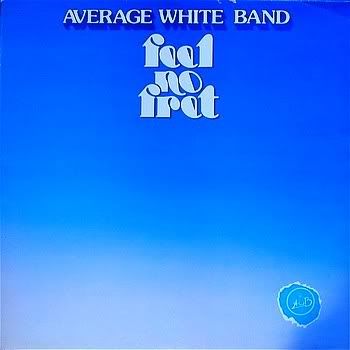
Average White Band - Feel No Fret - 1979 - Atlantic
Regarded by many as the AWB's weakest album. It is not up to the band's usual standards, but is still better than average, and well worth having for the one brilliant track, "Atlantic Avenue." Check out their "Cut the Cake," and "Person to Person" albums for a real taste of just how good this group was.
TRACKS
1 When Will You Be Mine (Average White Band/Gorrie)
2 Please Don't Fall in Love (Ball/Gorrie)
3 Walk on By (Bacharach/David)
4 Feel No Fret (Average White Band/Ferrone/Gorrie/Stuart)
5 Stop the Rain (Gorrie/Stuart)
6 Atlantic Avenue (Average White Band/Ferrone/Gorrie)
7 Ace of Hearts (Ferrone/Gorrie/Stuart)
8 Too Late to Cry (Stuart)
9 Fire Burning (Average White Band/Gorrie)
PERSONNEL
Alan Gorrie- Bass, Guitar (1, 2, 3, 6), Vocals, Hamish Stuart- Bass (1, 2, 3, 6), Guitar, Vocals, Onnie McIntyre- Guitar, Vocals Roger Ball- Keyboards, Saxophone, Horn & String Arrangements Malcolm Duncan- Saxophone, Sax (Tenor) Steve Ferrone- Drums, Percussion Production Credits The Average White Band - Producer Gene Paul - Engineer Benji Armbrister - Assistant Engineer
Additional Musicians
Airto Moreira- Percussion (4, 6)
Luis Carlos Dos Santos - Surdo (6) Zeca da' Cuica - Cuica (6) Michael Brecker- Sax (Tenor) Randy Brecker- Trumpet, Louis Del Gatto- Saxophone Luther Vandross - Background Vocal (8) Arif Mardin - String Arrangement on Ace Of Hearts
REVIEW
From their self-titled sophomore album of 1974 to 1978's Warmer Communications, the Average White Band enjoyed a commercial winning streak in the '70s; all of the albums they recorded for Atlantic during that period went either gold or platinum in the United States (and that is in addition to their impressive sales in Europe). But if any AWB album demonstrated that all good things must eventually come to an end, it was Feel No Fret. This 1979 LP marked the first time since 1973's Show Your Hand (also known as Put It Where You Want It) that an AWB album didn't enjoy either gold or platinum sales in the U.S., and it was also the most uneven album they recorded in the '70s. So what went wrong? Perhaps the absence of Arif Mardin was a factor; Mardin had produced all of AWB's previous Atlantic releases, whereas they produced Feel No Fret themselves. If Mardin had been encouraging the Scottish soul/funk band to go that extra mile, they settled for decent or competent on this record. Feel No Fret is far from a total meltdown, and the material is generally likable -- especially the good-natured "Atlantic Avenue," the slow-grinding "When Will You Be Mine," and a remake of the Burt Bacharach/Hal David favorite "Walk On By" (which became a minor hit and made it to number 32 on Billboard's R&B singles chart). But after Mardin-produced treasures like AWB, Soul Searching, Cut the Cake, and Warmer Communications, AWB followers had become extremely spoiled -- they expected excellence, not a record that was merely adequate. Nonetheless, hardcore devotees (as opposed to casual listeners) will want to hear this album, which Rhino reissued on CD as Feel No Fret...and More (with four bonus tracks added) in 1994. © Alex Henderson, All Music Guide
BIO
This unique act, an R'n'B/ soul group from Scotland with only two black musicians became one of the best selling and sounding funk bands in the world. The horn section started out as "The Dundee Horns". They can be heard on Johnny Nash's reggae hit "I Can See Clearly Now". Eric Clapton and Bonnie Bramlett (of Delaney & Bonnie) helped them on their way to becoming a household name. But it wasn't until they reached the US and were signed to Atlantic Records that the Average White Band really took off (Jerry Wexler signed them on the spot, after they hit him at home on one of his parties, where they played him the basic tracks for what would become the White Album: "AWB"). Arif Marden became their producer and together they couldn't do wrong. All of their seventies albums reached gold or even platinum status and hits such as the timeless "Pick Up The Pieces" and "Cut The Cake" were number 1 hits on the U.S. Billboard Charts. Tragedy hit the young group in 1974 when their drummer, Robbie McIntosh died at a Hollywood party in a drug-related incident, but their act only became stronger. The Double album "Person To Person", recorded during their American 1975 Tour, is among the best selling live funk albums ever. They reached the white market with their unique sound without losing respect from the core Soul/ R'n'B lover in the black communities. © 2007 Discogs





3 comments:
LINK
thanks a lot!!!
Thank YOU, drpiles. Enjoy the music, & come back soon...Cheers!
Post a Comment